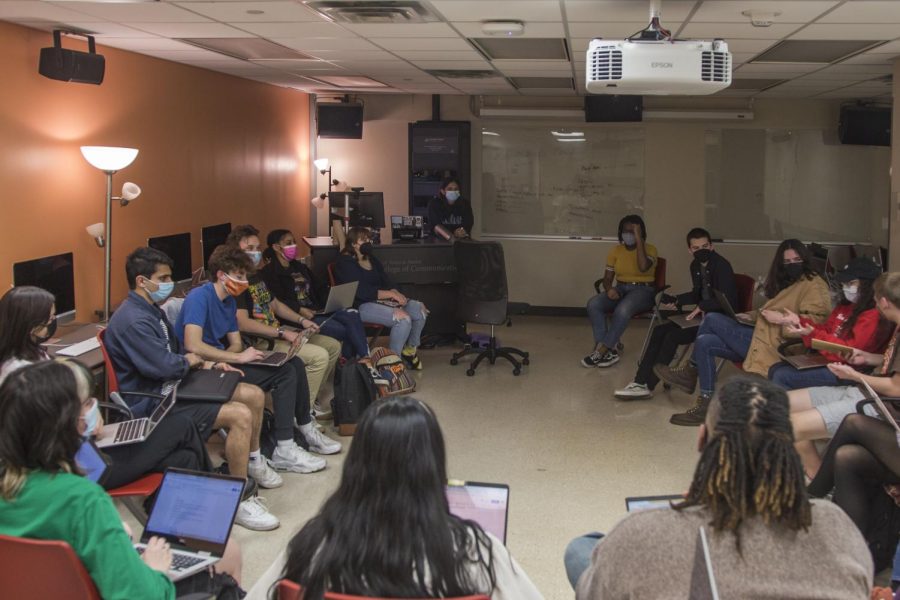Upcoming student-produced Chinese drama ‘Butterfly Knot’ incorporates traditional Chinese ideas while exploring themes of love, transformation
February 15, 2022
Editor’s note: This article first appeared in the Feb. 11, 2022 flipbook.
After seeing loved ones come and go in the fall semester, Katherine Zhang poured her emotions into her writing. Incorporating themes that felt like home, Zhang translated her ideas and feelings into the story for her pilot production, “Butterfly Knot.”
“I realized how fleeting life is, how you really need to make the most of everything and just appreciate the time you have,” said Zhang, an advertising, Chinese cultures and languages and Asian studies junior.
Collaborating with fellow students in the Texas Student Television Incubator Program, Zhang and her team continue to work on the production for “Butterfly Knot,” the first UT-based Chinese drama with a full Mandarin script. The first episode will air in May.
In the dramatic rom-com, the protagonist navigates patriarchal expectations and various forms of love. He initially assumes a role similar to that of Yue Lao, a Chinese deity who pairs couples together as a matchmaker.
“In mainstream media, most of the love we’re exposed to is romantic, and I feel like we tend to overlook other types of love, like platonic and familial love,” Zhang said.
The drama’s title takes inspiration from “The Butterfly Dream” anecdote of the “Zhuangzi,” a classical Chinese text from the Warring States period. In it, Chinese philosopher Zhuang Zhou contemplates reality after dreaming he transformed into a butterfly. Professor Luke Waring, whose studies focus on early Chinese literature and cultural history, said the passage explores carefree, existential concepts that guide Daoist values.
“(‘The Butterfly Dream’) helps us understand the different kinds of transformations and identity shifts we all go through in our lives,” Waring said. “We as people are always shuttling between different roles, (and these) can be very difficult to navigate. … The ‘Zhuangzi’ helps (and) eases us into that process.”
“Butterfly Knot” also includes Daoist art styles and motifs, which center on the universe as a whole. In the drama, the protagonist falls into a river and is rescued by a spirit of love. Waring said such natural symbolism commonly appears in Daoist texts.
“Water is supposed to be constantly flowing and in flux,” Waring said. “The Dao — ‘the way’ — is often described as dark water because it doesn’t transform or influence things by use of force. It goes around and subtly, softly changes.”
Rosie Khan, who took Waring’s Introduction to Classical Chinese class with Zhang last semester, said she spent time analyzing works from different dynasties and time periods. She said the foundational texts still apply today.
“It was so much fun learning classical Chinese through reading and translating these passages,” said Khan, a Plan II honors, government, international relations and global studies, economics, and Chinese senior. “Picking up the old style grammar and seeing how it’s still used in contemporary Chinese and more formal settings has been really enlightening.”
From reading parts of Zhang’s script, Khan said “Butterfly Knot” conveys cultural aspects through an engaging storyline with witty dialogue.
“It’s a really entertaining plot,” Khan said. “It’s not just intricate and well-written, but it’s (also) so humorous. … There’s many points in the script (that make) you burst out laughing.”
Sharing the extensive history of art and literature in her culture, Zhang said she wants the drama to provide an outlet for Asian creatives and encourage them to celebrate their own heritage.
“(This project) is a love letter to those students who have felt like they haven’t belonged their entire life because they haven’t seen people like them get into creative spaces,” Zhang said. “I really hope this will empower people to occupy spaces they wouldn’t have before.”












